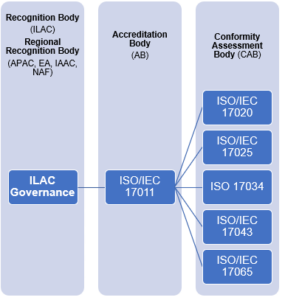What is Accreditation?
 Accreditation is a process in which an authoritative body assesses and awards formal recognition to an organization that fulfills specified requirements and is deemed competent to carry out specific tasks. An organization seeking accreditation is called a “conformity assessment body” or CAB, and is often a testing or calibration laboratory. The “authoritative body,” on the other hand, is a separate (independent) organization authorized by a recognition body to grant this accreditation. Who exactly is recognized to grant accreditation in a given region will vary.
Accreditation is a process in which an authoritative body assesses and awards formal recognition to an organization that fulfills specified requirements and is deemed competent to carry out specific tasks. An organization seeking accreditation is called a “conformity assessment body” or CAB, and is often a testing or calibration laboratory. The “authoritative body,” on the other hand, is a separate (independent) organization authorized by a recognition body to grant this accreditation. Who exactly is recognized to grant accreditation in a given region will vary.
The most important difference between accreditation and registration or certification is that accreditation confirms the overall competency of the organization, rather than only affirming the organization’s quality management system (QMS) or the specifications of a product, process, or service. Because the accreditation process examines the human element of an organization, it’s particularly important in technical fields where specific competencies will have an impact on the product or service provided.
However, the word “registration” is used to indicate that a particular product, process, service, person, or body demonstrates the characteristics necessary to be included on a specific publicly available list. Registration is sometimes also called certification, especially in Europe, which can certainly add to the confusion.
In AWPT’s training courses, we most often talk about quality system registration (or certification). To receive quality system registration, an organization must have a quality system that has been assessed as compliant with the requirements of a standard like ISO 9001. Any organization can be examined for this compliance, but this only means that its quality system meets requirements. It does not directly check or attest to the organization’s output, which means the output’s quality can vary depending on the organization’s operations. Thus, it is difficult to know how one producer’s output compares with another. Many different organizations, from international standardization bodies to local industry groups, have criteria for registering products, services, or companies.
What is Certification?
Certification is a written assurance that a product, process, or service conforms to specified requirements. For example: a product, such as a freezer or refrigerator, may be certified by Energy Star based on their specific requirements for that category of products. Organizations may also have an individual process or system – like a QMS – certified to indicate that it meets specific requirements.
Many organizations that certify products are accredited against another ISO standard called ISO/IEC 17065:2012 “Conformity assessment — Requirements for bodies certifying products, processes, and services.” Some of the confusion between registration, accreditation, and certification comes from the fact that many organizations issue a document called a “certificate of accreditation” or a “certificate of registration,” but a “certificate of accreditation” to ISO/IEC 17025, for example, indicates that the organization has ISO/IEC 17025 accreditation, not ISO/IEC 17025 certification.
Key Differences Been Accreditation and Certification
The difference between accreditation and certification can be boiled down to which part of the organization is being assessed. Certification is when a product, process, or service is assessed and conforms to specified requirements, while accreditation is an assessment of the organization overall, including internal processes and technical competency.
Accreditation vs. Certification: Which One Do You Need?
We’ve covered the definitions of accreditation, registration, and certification. But, which one should your organization pursue?
Industry Considerations
In many industries, certain organizations are required to be accredited by governing bodies or regulators. For example, cannabis labs in the state of California are required to be ISO/IEC 17025 accredited. In the United States, the FDA requires food testing labs to meet the requirements of the Laboratory Accreditation for Analyses of Foods (LAAF) program.
In other cases, organizations may voluntarily become accredited to give their customers, stakeholders, and the public more confidence in their products and services.
If your organization is required by a governing body to maintain accreditation, then you will need to work with an accreditation body to have your laboratory assessed. If your organization isn’t required to be accredited, you have the opportunity to decide to what extent and to which standard you want to be assessed. Consider factors like your industry and competition.
Marketability
Accreditation can also improve marketability and set an organization apart from its competitors in a given industry. Adding an accreditation status to your website, social media, testing reports, and advertising efforts can help you stand out as a reputable, reliable organization, especially if your competitors are not accredited.
Learn More About Accreditation and Certification with AWPT
To learn more about how you can prepare for conformity assessment, visit our about page.
If you’re not certain what form of conformity assessment activity, be it registration, certification, or accreditation would be most applicable to your business, contact the experts at AWPT. We can provide insight on standards applicable to your industry or region.
If you know what standard you need information on, but aren’t sure where to find it, we offer courses on a variety of different ISO standards, including self-directed e-learning. AWPT also offers a variety of consulting services as well.

